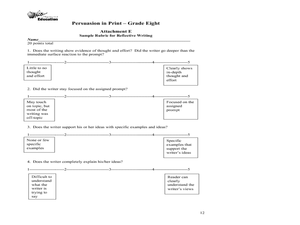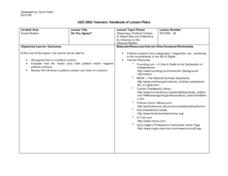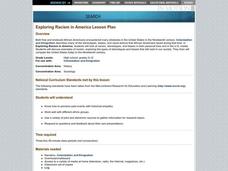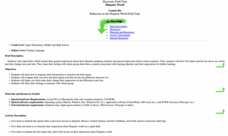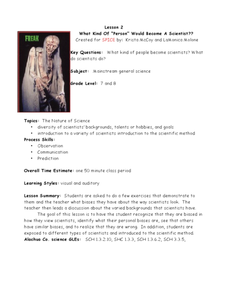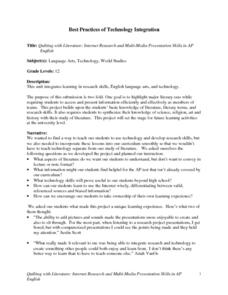Curated OER
Media Literacy: Discovering and Understanding Propaganda
Ninth graders study different types of propaganda and select an issue that is significant to them. In this exploratory lesson students design and create posters on the topic of their choice and write a narrative describing it.
Curated OER
Persuasion in Print
Advertisers target teenagers. Groups select three magazine advertisements for similar products, analyze the appeals used in each, create a poster that features the persuasive techniques used, and present their findings to the class. The...
Stanford University
Hurricane Katrina
The adage says that journalism is the first draft of history. How should people evaluate these sources of information? Taking into account various sources, including those from various perspectives and different creators, learners...
Curated OER
Not Getting the News about the Stamp Act
How did American colonists react to the Stamp Act of 1765? Your young historians will examine primary source material by reading excerpts from a transcription of the Pennsylvania Gazette and then identifying the sentiments expressed...
Curated OER
Do You Agree?
Students recognize bias in a political cartoon, evaluate how the media uses both positive and/or negative political cartoons, and assess the influence a political cartoon can have on a person.
Curated OER
What Influences Our Perception of Gender Roles?
Students research gender equity and the media. In this gender equity lesson plan, students evaluate the influence of various media on both individuals and society. Students discuss examples of media that portray gender roles...
Curated OER
Exploring Racism in America
Students compare racism today to racism that existed during the nineteenth century. As a field research project, students individually keep track of examples of racism, biases, and stereotypes illustrated throughout the US media over a...
National Center for Case Study Teaching in Science
Cell Phone Use and Cancer
The cell phone you're using is making you deaf: news at 11:00. Oftentimes, the media uses fear tactics and other techniques to increase its audience base. In an intriguing look at the difference between scientific journals and...
Curated OER
Stonewall and Beyond:
High schoolers examine issues that surround the quest for gay/lesbian equal rights, explore bias and negative stereotyping in the media and their effect on how gays and lesbians are treated, examine their own biases, and express their...
Curated OER
In the News
Students research a report using a local or national news story. They exchange reports with a partner in order to examine an issue. They work together to create a report on a global issue.
Curated OER
Depicting Women and Class in a Global Society
Students analyze the evolution of women's work from the 19th century to present day and create artwork depicting women. In this women's roles lesson plan, students compare and contrast the use of space and color in the two paintings...
Curated OER
Your Angle on the Story
Students review several articles on same current event, and then cover news issues themselves while assuming secret identities of various individuals who have vested interests in issue. Students write newspaper articles from these...
Curated OER
Hispanic World - Lesson Six
Students explore a Spanish speaking country and compare their research to their initial expectations and biases regarding the Hispanic culture. They share their findings with the class.
Curated OER
Using a Graphic Organizer to Critically Observe Televised News Broadcasts
Students compare two television news broadcasts. They discuss how to organize information when comparing two objects and read and discuss two books to create a Venn diagram to compare both books. After creating the diagram, they view...
Encyclopedia Britannica
Campaign Photo Analysis
It's the art of the image! As part of a study of the 2020 Presidential race, groups analyze an image of a candidate, first from an objective point of view and then subjectively. They then prepare a presentation detailing what they...
iCivics
Mini-Lesson: Executive Orders
Can the President of the United States pass a law all by himself? Scholars investigate the concept of the executive order in regards to the powers of the presidency. They use current issues and events to monitor media bias while also...
Curated OER
What Kind of "Person" Would Become a Scientist?
"Scientist Stereotypes" could be another name for this lesson! Begin by drawing from middle schoolers' preconceived notions and media portrayal of scientists, and then explain that anyone can be a scientist. Even though there is an...
Curated Video
Detecting Lies & Harmful Links
Who and what can you trust online? How do you know? After viewing a pair of introductory videos on positive and safe online conduct, learners discuss the content and put it into practice during an online search activity about alien...
Curated OER
The Art of Persuasion-Analysis of Argument
Analyze advertising techniques in order to pinpoint persuasive strategies that writers use. These same techniques are then examined in persuasive speeches. You will have to find your own advertisements, but speeches are included. Finish...
Curated OER
Quilting with Literature: Internet Research and Multi-Media Presentation Skills in AP English
Have your class acquire research skills such as using hotlists and evaluating websites while they study major literary eras. They create multimedia presentation using information from the Internet research.
Curated OER
A Picture is Worth How Many (unfiltered) Words?
Learners explore Google search engine in and out of China, examine events surrounding confrontation at Tiananmen Square between Chinese forces and the Tank Man, and discuss how censorship affects what the media reports and what the...
Curated OER
Health and Food Safety
Students discuss ways to keep healthy, and examine factors that influence health, including media. They then participate in mock public meeting on genetically modified foods in order to explore importance of governmental decisions in...
Curated OER
Interactive Duty
Pupils consider the role of multimedia news features. They analyze the New York Times coverage of the president's State of the Union address.
Curated OER
Universal Suffrage
Students explore concept of suffrage. In this voting rights lesson, students participate in a classroom activity that excludes girls from voting. Students discuss gender issues and write essays regarding the restriction of voting rights.



